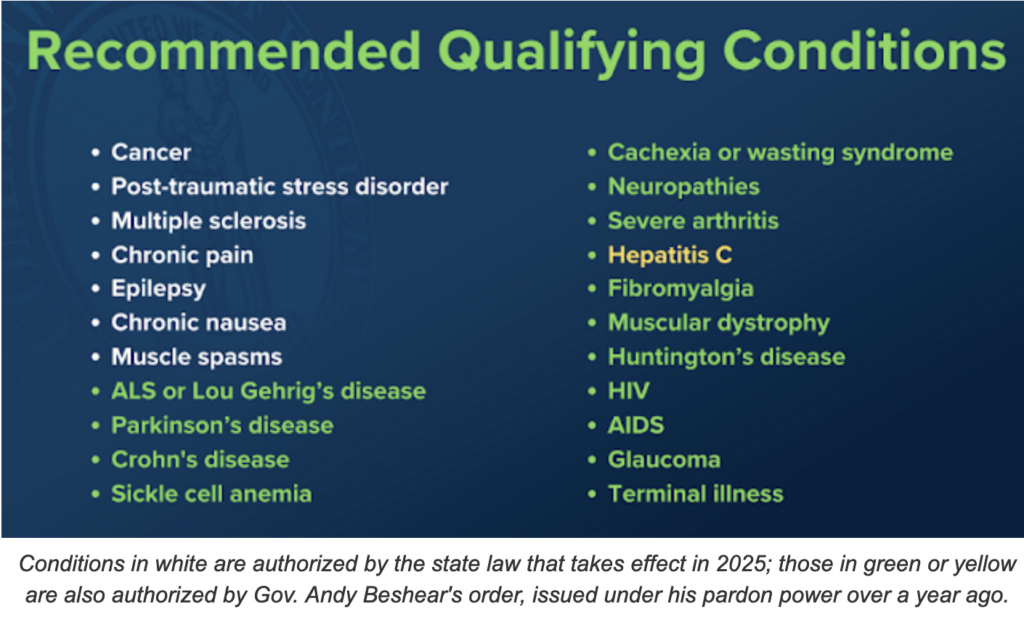Governor wants more conditions added to medical marijuana list
Published 12:46 pm Monday, January 15, 2024
By Melissa Patrick
Kentucky Health News
Gov. Andy Beshear wants 15 more health conditions to be added to the list of qualifying conditions in the state’s legislatively authorized medical-marijuana program, set to take effect in 2025.
Beshear said Thursday that he was making this recommendation along with the Board of Physicians and Advisors and the Team Kentucky Medical Cannabis Workgroup, which on Dec. 21 sent separate letters to legislative leaders recommending the changes be made in the 2024 session.
The list of recommended qualifying conditions should include ALS or Lou Gehrig’s disease, Parkinson’s disease, Chron’s disease, sickle cell anemia, cachexia or wasting syndrome, neuropathies, severe arthritis, fibromyalgia, muscular dystrophy, Huntington’s disease, HIV, AIDS, glaucoma and terminal illness. And, he said, one of the groups has recommended hepatitis C to be added to that list.
“They are included in most other states’ programs, they are very serious conditions that we believe, but more importantly, these medical groups and advisory groups all unanimously agree should become a part of the program,” Beshear said Thursday at his weekly press conference.
The eligible conditions in the current law, passed by the legislature in 2023, are cancer, multiple sclerosis, muscle spasms or spasticity, chronic pain, epilepsy, chronic nausea and post-traumatic stress disorder.
Expanding the list would allow an estimated 437,000 more Kentuckians to benefit from the program, said Beshear.
“This is 437,000 Kentuckians that are suffering from or dealing with the conditions that we just showed up there that are not currently eligible, very serious conditions that would then become eligible for this program,” he said.
However, key legislators told Bruce Schreiner of The Associated Press that the request to expand the number of eligible conditions in the program would have trouble getting out of wither legislative chamber.
Sen. Stephen West, R-Paris, told AP that in passing his bill to legalize medical cannabis for some conditions in 2023, the lawmakers “went back and forth” before reaching consensus on which conditions would qualify.
“I think there will be much consternation if we start tinkering with the list of conditions it covers,” West told Schreiner.
Rep. Jason Nemes, R-Middletown, a long-time supporter of medical cannabis, agreed. “I don’t think now is the time to make those adjustments,” he told Schreiner.
Beshear and Sam Flynn, executive director of the Kentucky Medical Cannabis Program, said they were talking to legislators about some of the technical changes needed in the bill and their request to add the additionally recommended qualifying conditions.
“We’ve had some productive conversations, particularly with . . . Senator West,” said Flynn. “We feel really good about those conversations. As the governor mentioned, there are some some technical changes that we’re looking for Senator West and others to take a look at, as well as now expanding the the qualifying conditions based on the recommendations made by both the Board of Physicians and Advisors and the Team Kentucky Medical Cannabis Workgroup.”
Beshear added that the law gives the Kentucky Cannabis Center at the University of Kentucky unilateral power to add conditions, but “They’ve told us that they don’t want to do it.”
“And, if that’s the case, we need to make a change in the law,” he said. “Now, their position might change. It’s the legislative session, and they’ll have to look at legislators and say that they’ve told us they don’t want to do it. So we want to make sure that we’re transparent about . . . things that they can add while they’re here or the legislature can empower a different group. They created that group of doctors and other medical professionals that have suggested this. I mean, our recommendation to them is give that group the power to expand. I mean, that’s both under the legislation they created, they created how the board is made up and that will seem like a logical place to go.”
In November 2022, Beshear issued an executive order allowing Kentuckians who meet a detailed set of requirements to possess up to 8 ounces of marijuana for medical use. The drug must to be bought in a state where sale of cannabis is legal, and the person needs the receipt and a certification from a health-care provider saying that they have at least one of 21 specific conditions. Beshear’s order is in the form of an advance, conditional pardon.
Beshear said Thusday his administration has 10 new regulations to say how medical-cannabis businesses, including cultivators, processors, producers, dispensaries and safety-compliance facilities, will operate in the state.
“These regulations will ensure that Kentucky’s medical cannabis program is safe and accessible for all patients and to make sure that they are secure for our communities,” he said.
The governor also announced a partnership with Tyler Technologies and Metric to help establish the medical cannabis electronic monitoring system and patient/caregiver registry. And, he said, the state has launched an online zoning tool to help medical cannabis businesses determine where they can operate.







